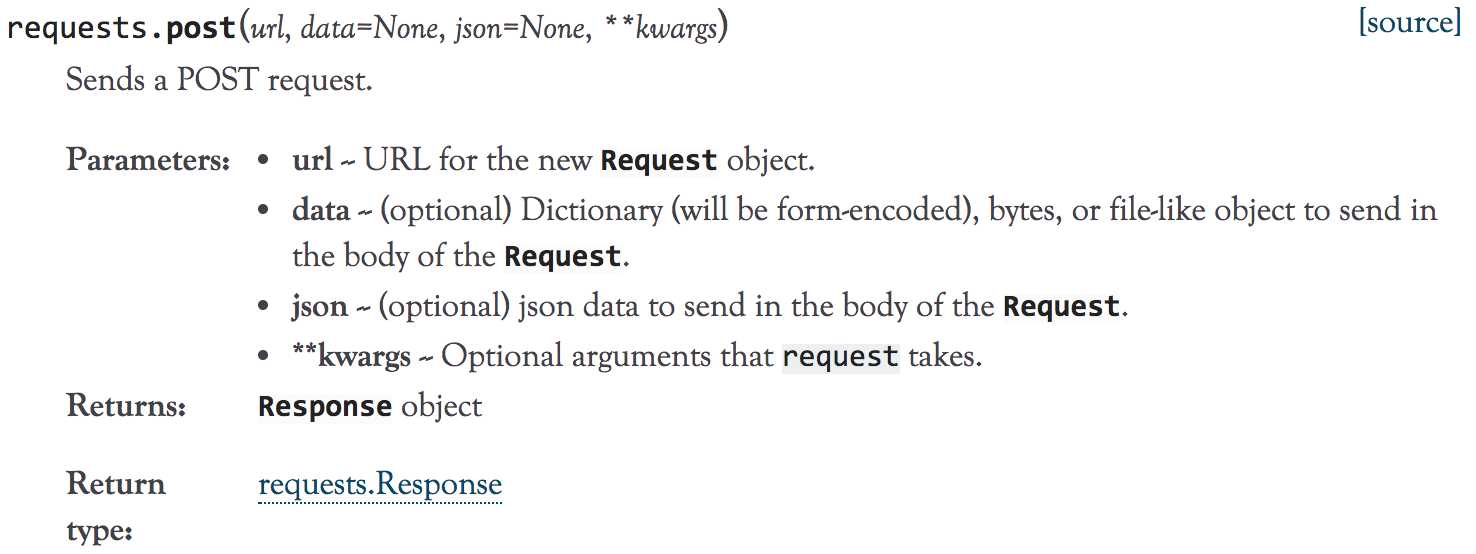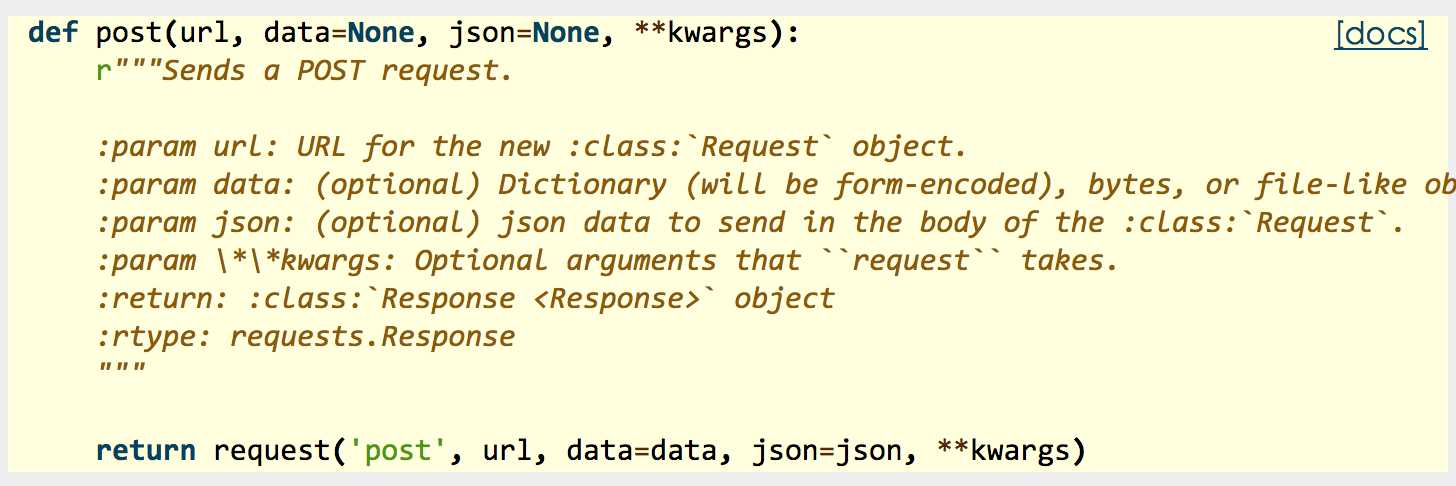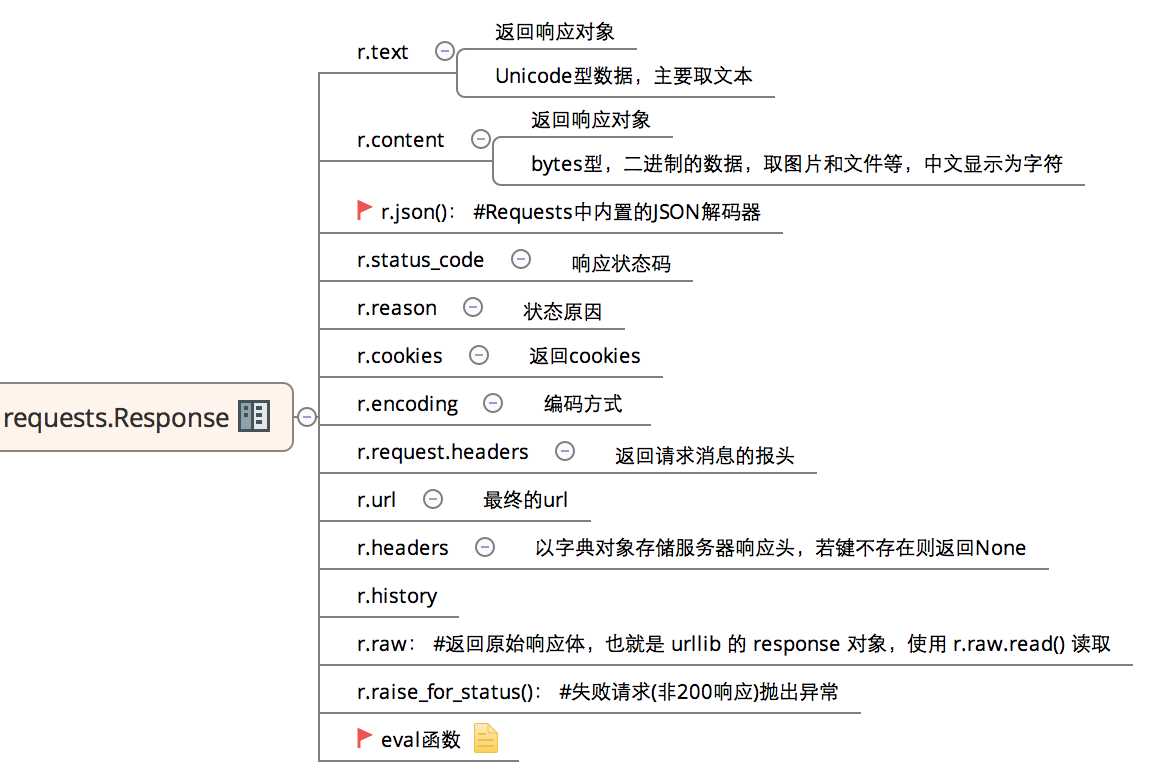标签:host file res 多文件上传 connect img int cat cep
上一节介绍了 requests.get() 方法的基本使用,本节介绍 requests.post() 方法的使用:
本文目录:
一、方法定义
二、post方法简单使用
1、带数据的post
2、带header的post
3、带json的post
4、带参数的post
5、普通文件上传
6、定制化文件上传
7、多文件上传
一、方法定义:
1、到官方文档去了下requests.post()方法的定义,如下:

2、源码:

3、常用返回信息:

二、post方法简单使用:
1、带数据的post:
# -*- coding:utf-8 -*- import requests import json host = "http://httpbin.org/" endpoint = "post" url = ‘‘.join([host,endpoint]) data = {‘key1‘:‘value1‘,‘key2‘:‘value2‘} r = requests.post(url,data=data) #response = r.json() print (r.text)
输出:
{ "args": {}, "data": "", "files": {}, "form": { "key1": "value1", "key2": "value2" }, "headers": { "Accept": "*/*", "Accept-Encoding": "gzip, deflate", "Connection": "close", "Content-Length": "23", "Content-Type": "application/x-www-form-urlencoded", "Host": "httpbin.org", "User-Agent": "python-requests/2.18.1" }, "json": null, "origin": "183.14.133.88", "url": "http://httpbin.org/post" }
2、带header的post:
# -*- coding:utf-8 -*- import requests import json
host = "http://httpbin.org/" endpoint = "post" url = ‘‘.join([host,endpoint]) headers = {"User-Agent":"test request headers"} # r = requests.post(url) r = requests.post(url,headers=headers) #response = r.json()
输出:
{ "args": {}, "data": "", "files": {}, "form": {}, "headers": { "Accept": "*/*", "Accept-Encoding": "gzip, deflate", "Connection": "close", "Content-Length": "0", "Host": "httpbin.org", "User-Agent": "test request headers" }, "json": null, "origin": "183.14.133.88", "url": "http://httpbin.org/post" }
3、带json的post:
# -*- coding:utf-8 -*- import requests import json host = "http://httpbin.org/" endpoint = "post"
url = ‘‘.join([host,endpoint]) data = { "sites": [ { "name":"test" , "url":"www.test.com" }, { "name":"google" , "url":"www.google.com" }, { "name":"weibo" , "url":"www.weibo.com" } ] } r = requests.post(url,json=data) # r = requests.post(url,data=json.dumps(data)) response = r.json()
输出:
{ "args": {}, "data": "{\"sites\": [{\"url\": \"www.test.com\", \"name\": \"test\"}, {\"url\": \"www.google.com\", \"name\": \"google\"}, {\"url\": \"www.weibo.com\", \"name\": \"weibo\"}]}", "files": {}, "form": {}, "headers": { "Accept": "*/*", "Accept-Encoding": "gzip, deflate", "Connection": "close", "Content-Length": "140", "Content-Type": "application/json", "Host": "httpbin.org", "User-Agent": "python-requests/2.18.1" }, "json": { "sites": [ { "name": "test", "url": "www.test.com" }, { "name": "google", "url": "www.google.com" }, { "name": "weibo", "url": "www.weibo.com" } ] }, "origin": "183.14.133.88", "url": "http://httpbin.org/post" }
4、带参数的post:
# -*- coding:utf-8 -*- import requests import json host = "http://httpbin.org/" endpoint = "post" url = ‘‘.join([host,endpoint]) params = {‘key1‘:‘params1‘,‘key2‘:‘params2‘} # r = requests.post(url) r = requests.post(url,params=params) #response = r.json() print (r.text)
输出:
{ "args": { "key1": "params1", "key2": "params2" }, "data": "", "files": {}, "form": {}, "headers": { "Accept": "*/*", "Accept-Encoding": "gzip, deflate", "Connection": "close", "Content-Length": "0", "Host": "httpbin.org", "User-Agent": "python-requests/2.18.1" }, "json": null, "origin": "183.14.133.88", "url": "http://httpbin.org/post?key2=params2&key1=params1" }
5、普通文件上传:
# -*- coding:utf-8 -*- import requests import json host = "http://httpbin.org/" endpoint = "post"
url = ‘‘.join([host,endpoint]) #普通上传 files = { ‘file‘:open(‘test.txt‘,‘rb‘) } r = requests.post(url,files=files) print (r.text)
输出:
{ "args": {}, "data": "", "files": { "file": "hello world!\n" }, "form": {}, "headers": { "Accept": "*/*", "Accept-Encoding": "gzip, deflate", "Connection": "close", "Content-Length": "157", "Content-Type": "multipart/form-data; boundary=392865f79bf6431f8a53c9d56c62571e", "Host": "httpbin.org", "User-Agent": "python-requests/2.18.1" }, "json": null, "origin": "183.14.133.88", "url": "http://httpbin.org/post" }
6、定制化文件上传:
# -*- coding:utf-8 -*- import requests import json host = "http://httpbin.org/" endpoint = "post" url = ‘‘.join([host,endpoint]) #自定义文件名,文件类型、请求头 files = { ‘file‘:(‘test.png‘,open(‘test.png‘,‘rb‘),‘image/png‘) } r = requests.post(url,files=files) print (r.text)heman793
输出比较在,就不帖了。
7、多文件上传:
# -*- coding:utf-8 -*- import requests import json host = "http://httpbin.org/" endpoint = "post" url = ‘‘.join([host,endpoint]) #多文件上传 files = [ (‘file1‘,(‘test.txt‘,open(‘test.txt‘, ‘rb‘))), (‘file2‘, (‘test.png‘, open(‘test.png‘, ‘rb‘))) ] r = requests.post(url,files=files) print (r.text)
输出上,太多内容,不帖了。
8、流式上传:
# -*- coding:utf-8 -*- import requests import json host = "http://httpbin.org/" endpoint = "post" url = ‘‘.join([host,endpoint]) #流式上传 with open( ‘test.txt‘ ) as f: r = requests.post(url,data = f) print (r.text)
输出:
{ "args": {}, "data": "hello world!\n", "files": {}, "form": {}, "headers": { "Accept": "*/*", "Accept-Encoding": "gzip, deflate", "Connection": "close", "Content-Length": "13", "Host": "httpbin.org", "User-Agent": "python-requests/2.18.1" }, "json": null, "origin": "183.14.133.88", "url": "http://httpbin.org/post" }
python接口自动化测试(三)-requests.post()
标签:host file res 多文件上传 connect img int cat cep
原文地址:http://www.cnblogs.com/puresoul/p/7488700.html